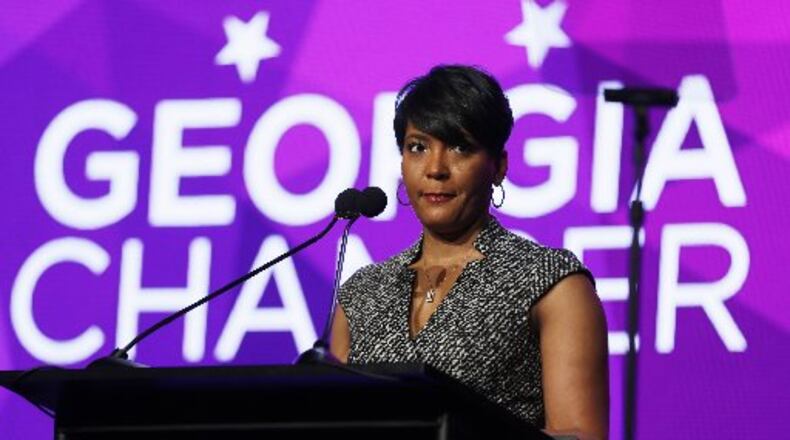The $800,000 in bonuses and cash awards handed out by former Mayor Kasim Reed near the end of his term in 2017 violated city law and the state Constitution. So did employee bonuses provided that same year by members of Atlanta City Council, and Reed’s human resources commissioner.
On Monday, the council passed legislation to try to bring the process of awarding employee bonuses into compliance with city ordinances and the state gratuities law, which says governments can not give away money and must receive “substantial” public benefit in return for expenditures.
The new ordinance says that guidelines and eligibility criteria will be established that will allow the mayor and council members to select bonus recipients, and that the criteria must be “based upon a defined benefit to the public.”
But the ordinance itself doesn’t establish those criteria, leaving that job to a mayoral representative and individual council members. It is unclear whether the criteria established by the various elected or appointed officials will comply with the gratuities law, which says bonuses must be given prospectively and not as a reward for past performance.
“I think some of the wording could still use some work,” Council President Felicia Moore said of the ordinance. “But it’s what the mayor and the council wanted.”
The city’s law department said in a statement to The Atlanta Journal-Constitution that bonuses can be legally awarded by establishing the public benefit of work beyond an employee’s normal duties.
“By developing a policy which states under what circumstances an employee would be eligible for a bonus, the employee can meet those requirements and receive the bonus,” the statement says.
The bonuses can only to go permanent, full-time employees and can’t be considered when determining employee pensions. City Auditor Amanda Noble says the new ordinance was reviewed by her office, the city’s ethics officer, along with the Human Resources and Law departments.
“As with the private sector, our Administration has worked to create a fair and transparent process, now establishing criteria and metrics that justify performance awards,” Bottoms said in a prepared statement. “This legislation cements accountability in the process.”
Nobel and Atlanta Ethics Officer Jabu Senogva issued a stinging report in August that found the 2017 bonuses not only violated the law but that top city officials conspired to bypass internal controls in a manner that violated city code, and that Chief Financial Officer Jim Beard "abused" his position by authorizing a bonus for himself.
Ethics charges have since been filed against Beard for his extravagant spending with a city-issued credit card.
The AJC and Channel 2 Action News reported extensively last year on the 2017 bonuses, and found that about $500,000 in bonuses and cash prizes actually cost taxpayers more than $800,000 because the amounts were increased so that the public — and not individual recipients — paid the taxes.
Five of Reed’s top cabinet officials each received $21,000 checks — enough to cover taxes on $15,000 bonuses. Thirty-seven others got bonuses of either $10,000 or $5,000, which after taxes cost the public a combined $459,000.
Former Human Resources Commissioner Yvonne Yancy also awarded bonuses to some of her staff, personally handing out 11 checks at a combined public cost of $84,000.
Ten of 16 City Council members gave bonuses to their staffs, which added up to $88,000. The internal investigations found those bonuses also violated the gratuities law.
The new ordinance also says no employee may receive a bonus that amounts to more than 10 percent of their base salary, and that bonus awards can only come from “excess” money in departmental operating budgets.
Our reporting:
The Atlanta Journal-Constitution and Channel 2 Action News published a series of stories last year about bonuses and cash awards handed out by former Mayor Kasim Reed and the Atlanta City Council in December 2017. The news organizations found that the bonus amounts were increased so that the public — and not the individual recipients — paid taxes on the awards. In all, the bonuses and cash prizes cost taxpayers more than $800,000. Investigations by an outside law firm and by the city’s internal auditor and ethics office found the awards violated city charter and the state constitution. Several of Reed’s cabinet members gave back a combined $89,000 in bonus awards after it all became public.
About the Author
Keep Reading
The Latest
Featured


